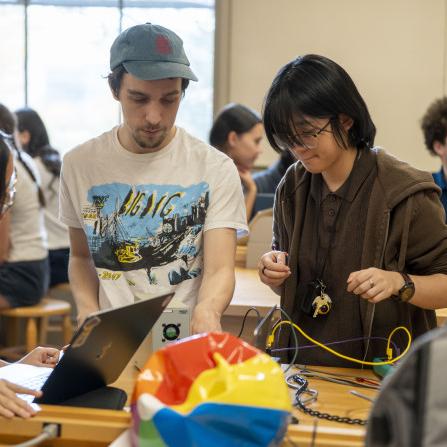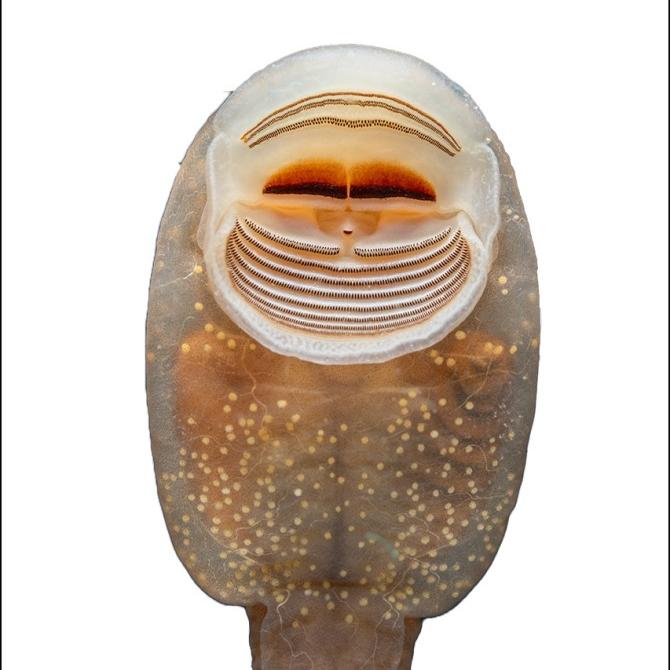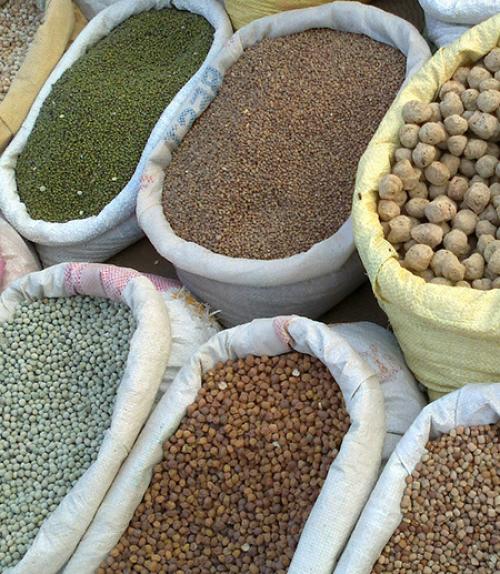New York apple farmers, wastewater treatment facilities, new energy technologies, rural-urban systems and leopards in Nepal all stand to get a sustainability boost from the Atkinson Center for a Sustainable Future’s 2019 Academic Venture Fund (AVF) awards.
The center has awarded more than $1.3 million in AVF seed grants to support 10 interdisciplinary research collaborations that address global sustainability challenges. This year’s awards involve 36 researchers from seven Cornell colleges and 20 academic departments, tapping university expertise in crucial sustainability areas like food security, carbon sequestration, building climate-positive environments and One Health.
The Atkinson Center is also partnering with the Office of Engagement Initiatives (OEI) in support of Engaged Cornell, which provides grants for AVF projects that incorporate undergraduate research opportunities and community engagement.
The 2019 funded projects:
Investigators: Buz Barstow, biological and environmental engineering; Esteban Gazel, earth and atmospheric sciences; Mingming Wu, biological and environmental engineering.
Spoiling Fish as Food: Harmful Algal Blooms in Lake Victoria: Marine and freshwater ecosystems worldwide are increasingly threatened by cyanobacteria-producing harmful algal blooms (cyanoHABs). However, the impacts on people in developing nations and communities that depend on fisheries are not well understood. By assessing the risk-benefit tradeoffs of fish consumption across the food web and analyzing how fishers and consumers understand and respond to cyanoHABs in Africa’s Lake Victoria, this project will diagnose how changing ecosystems and behaviors translate into health and economic impacts, generating insights that will be relevant to many modern food systems facing environmental change.
Investigators: Kathryn Fiorella, population medicine and diagnostic sciences; Peter McIntyre, ecology and evolutionary biology; Christopher Barrett, Charles H. Dyson School of Applied Economics and Management.
Living With Leopards: Exploring Effects of Human-Leopard Interaction on Food Security and Public Health: In Nepal, the conflict between humans and leopards results in the loss of livestock, injuries and death to leopards and people, and threatens the food security of local communities. This project aims to understand key drivers and impacts of human-leopard interactions across the rural-urban spectrum of human settlements and forests in the foothills of the Himalayas. A national-level policy document will be developed to enable conflict management responses and promote local stewardship for the survival of leopards in shared landscapes without compromising human well-being.
Investigators: Angela Fuller, natural resources; Martin Gilbert, population medicine and diagnostic sciences; Richard Stedman, natural resources.
Sustainable Pollination Resources for New York Apple Farmers: Farmers whose crops rely on pollination by insects have to be careful in how they manage land and pollinators, such as wild and domesticated bees – particularly because management of these resources affects yield, input costs and profits, and the sustainability of pollination resources themselves. This project will bring together innovative methods in economics, dynamic optimization, behavioral economics, game theory, entomology and agronomy to develop a model that will help New York apple growers explore a variety of investment and management strategies to increase productivity, profitability, agricultural sustainability and biodiversity.
Investigators: David Just, Charles H. Dyson School of Applied Economics and Management; Bryan Danforth, entomology; Miguel Gómez, Charles H. Dyson School of Applied Economics and Management; C.-Y. Cynthia Lin Lawell, Charles H. Dyson School of Applied Economics and Management; Katja Poveda, entomology.
Seed Mixtures for Climate Resilience in Ethiopia: Agrobiodiversity, developed and maintained by farmers worldwide for thousands of years, can provide growers with options in the face of climate change. However, the movement of farmers from rural areas toward new market opportunities in urban centers is likely to impact management of agrobiodiversity. This project will investigate how smallholders in Ethiopia use mixtures of crop species and varieties to mitigate the effects of drought, waterlogging, pathogens, pests and other climate-related stresses and enhance the resilience of their food systems.
Investigators: Alison Power, ecology and evolutionary biology; Rachel Bezner Kerr, development sociology; Miguel Gómez, Charles H. Dyson School of Applied Economics and Management; Mark Sorrells, plant breeding and genetics.
Expanding AnyTown USA Wastewater Treatment Facilities Into Local Microgrid Hubs: Wastewater treatment facilities are promising hubs for integrating food-water-energy systems. However, most of these facilities do not recover energy or nutrients, and they account for up to 4% of all U.S. electricity consumption. Researchers will use the Ithaca Area Wastewater Treatment Facility as a case study to test emerging technologies that increase energy production and nutrient recovery, and create a tool that guides these municipal facilities in modifying operations.
Investigators: Ruth Richardson, civil and environmental engineering; Lori Leonard, development sociology; Jefferson Tester, chemical and biomolecular engineering; Fengqi You, chemical and biomolecular engineering; Francis Vanek, civil and environmental engineering.
Get the Lead Out: Alternative Ammunition Can Solve a One Health Conundrum: Despite successful efforts to remove lead from gasoline, paint, household products and drinking water, it persists in hunting ammunition and continues to harm the humans, bald eagles and other omnivores who ingest it when consuming game meat, typically venison. Evidence suggests there is little awareness among hunters or other consumers that venison may be contaminated by lead particles. Researchers will test messages with hunters and nonhunters via short videos that highlight the risks of lead ammunition to wildlife and human health, and describe non-lead alternatives.
Investigators: Krysten Schuler, population medicine and diagnostic sciences; Katherine McComas, communication; Elizabeth Bunting, population medicine and diagnostic sciences; Brenda Hanley, population medicine and diagnostic sciences.
Grazing Sheep on Solar Array Sites to Boost Pollinator Habitat and Sequester Soil Carbon: Growing commitments to renewable energy indicate that the land used for solar sites will increase dramatically over the next years, with projections of up to 40,000 acres in New York state alone. The vegetation in these modified landscapes must be controlled to prevent solar panel shading. Grazing with sheep is an efficient, cost-effective way to control the vegetation and keep the land in agricultural production. This project will document how sheep grazing may influence pollinator habitat and sequestration of soil carbon.
Investigators: Michael Thonney, animal science: Scott McArt, entomology; Johannes Lehmann, soil and crop sciences.
Combined Solar Heating and Thermoelectric Generation as Distributed Energy Resources: To help address increasing energy needs and reduce greenhouse gas emissions, researchers will explore a new cogeneration system that combines solar heating for residential and commercial buildings, and thermoelectric energy generation. This system will simultaneously supply heat and electricity from solar heat with zero carbon dioxide emissions. The combined solar heating and thermoelectric generation, which is not intended to replace large-scale power plants, would be particularly useful for isolated areas that are not on a traditional electric grid, therefore advancing the development of resilient rural-urban systems.
Investigators: Zhiting Tian, mechanical and aerospace engineering; Lang Tong, electrical and computer engineering; Khurram Afridi, electrical and computer engineering; Nicholas Sanders, policy analysis and management.
power As the urgency of climate change creates ecological, economic and social uncertainty, design research will be an increasingly important tool. A new interdisciplinary team – with expertise in landscape architecture, architecture, climate-smart agriculture, soils and life-cycle analysis – will hold a series of joint fact-finding workshops with external partners and stakeholders to design prototypes for climate-positive buildings and landscapes for the Finger Lakes region.
Investigators: Jamie Vanucchi, landscape architecture; Timur Dogan, architecture; Johannes Lehmann, soil and crop sciences; Allison Chatrchyan, earth and atmospheric sciences; Fengqi You, chemical and biomolecular engineering.
David Nutt is managing editor of the Atkinson Center.






